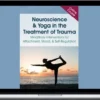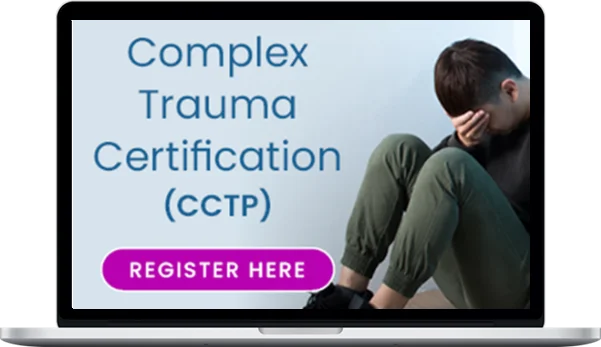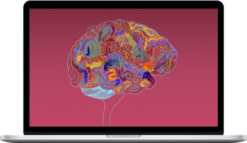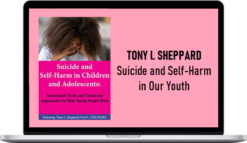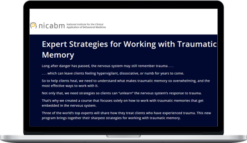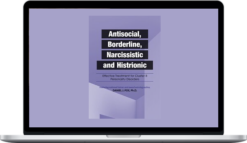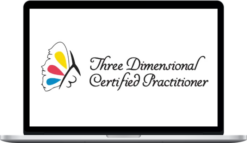Pam Stavropoulos – Complex Trauma Training (CCTP)
$149.00 $75.00
»Delivery: Within 21 days
Description
Pam Stavropoulos – Complex Trauma Training (CCTP)
Master powerful interventions for healing complex trauma
Become a Certified Clinical Trauma Professional!
When a client with complex trauma walks into your office, they have already learned to expect abandonment, betrayal, and hurt.
If you don’t have the right skills, working with these clients can feel impossible.
But it doesn’t have to be that way.
Inside this program you’ll discover a powerful approach for healing complex trauma to help even your most distressed clients find safety and healing.
Join Australia’s leading trauma treatment experts, including Pam Stavropoulos, PhD; Jackie Burke, MAPS; and Leonie Stewart, MCAP; as they walk you step-by-step through a proven 3-part framework for treating complex trauma and share practical, targeted interventions from somatic therapy, parts work, and polyvagal theory that you can tailor to each client’s individual needs.
Upon completion of this course, you’ll be eligible for certification as a Clinical Trauma Professional (CCTP) at no additional cost.
Register today to establish yourself as a trusted expert in complex trauma treatment!
How This Course Works
In 5 focused, in-depth sessions, you’ll unlock a proven treatment framework for healing complex trauma as well as practical interventions and strategies for helping traumatized, dissociative, and dysregulated clients find safety and well-being.
Inside the course you’ll discover how to…
- Stabilize distressed clients and prevent overwhelm
- Tailor your interventions to meet the unique needs of each client
- Identify subtle signs of trauma-related dissociation for timely intervention
- Manage challenging symptoms such as dissociation and self-harm
- Interrupt unconscious patterns of trauma re-enactment in your clients, paving the way for lasting healing
You’ll finish this self-paced programme with a comprehensive toolkit of strategies for the specific needs of complex trauma clients.
But that’s not all… because this program also includes all the educational requirements become a Certified Clinical Trauma Professional (CCTP) and your initial 2-year certification is FREE (a $249.95 value)!
As a Certified Clinical Trauma Professional, you’ll stand out from the crowd and let clients and colleagues know you’ve invested the time and effort needed to provide treatment at the highest level.
What You’ll Discover In This Course
Part 1: Your 3-Part Framework for Healing Complex Trauma
Session 1: The Key Features of Complex Trauma
- Critical differences between single incident and complex PTSD and trauma and the subtle signs of complex trauma that many clinicians miss
- Why dissociation is so hard to recognize — and 2 simple ways to assess for dissociative disorders
- How complex trauma disrupts your client’s sense of self and how to use parts work to heal
- Subtle nonverbal cues that reveal your client is re-enacting their trauma… with you… in therapy… and how to interrupt unconscious re-enactments
- How to work with projective identification and transference
Session 2: Guiding Clients Through the 3 Phases of Recovery from Complex Trauma
- Introduction to the 3-phase treatment model for complex trauma
- A common mistake to avoid with complex trauma clients
- Using the window of tolerance to improve your client outcomes
- Phase 1: Stabilizing and resourcing
- How to establish rapport with a client whose past has taught them to expect betrayal
- When standard grounding techniques are inappropriate for complex trauma clients… and what to do instead
- Phase 2: Processing complex trauma
- How to help your client process implicit memories in order to heal
- When and how to use parts work with unresolved complex trauma
- Phase 3: Integration
- Powerful strategies to help clients recognize and assess their trauma-related beliefs
- How to help your clients create meaning after trauma
Part 2: Essential Clinical Skills for Complex Trauma Healing
Session 3: Attuning to Dissociative Identity Disorder
- Common myths and misconceptions about dissociative identity disorder (DID)
- Key principles for working with DID: essential concepts and techniques
- Dissociative coping in early life trauma: 4 ways trauma impacts the brain and memory
- How to recognize the difference between healthy multiplicity and trauma-generated dissociative self-states, so you can target your treatment
- The limits of ‘standard’ parts work in the context of structural dissociation and DID and other approaches to use with dissociative clients
- How to deal with immediate and ongoing psychotherapeutic challenges: stabilisation, safety, and grounding
Session 4: Teaching Self-Regulation Skills for Traumatised Clients on a Path to Recovery
- Why self-regulation is especially difficult… yet important… for clients healing from trauma
- A polyvagal approach to emotional regulation: the ‘accelerators’ and ‘brakes’ that manage hypo- and hyper- arousal in the nervous system
- How to tailor regulation exercises for individual clients
- Practical strategies for managing emotional discomfort in and out of session: body-based techniques for working with overwhelm, collapse, withdrawal, shame, and anger
Session 5: Somatic Interventions for Complex Trauma
- Applying Somatic Sensing with past trauma: a simple safety exercise to use with distressed clients
- Use parts theory to resolve internal conflicts and promote emotional integration
- Tools for helping clients tune into sensations with curiosity and self-compassion
- Explore focusing techniques to aid in the reprocessing of traumatic memories
- Watch a seasoned clinician demonstrate how to: manage overwhelm, build resilience, set protective boundaries, and guide a trauma client through a loving kindness meditation
More courses from the same author: Pam Stavropoulos
Delivery Policy
When will I receive my course?
You will receive a link to download your course immediately or within 1 to 21 days. It depends on the product you buy, so please read the short description of the product carefully before making a purchase.
How is my course delivered?
We share courses through Google Drive, so once your order is complete, you'll receive an invitation to view the course in your email.
To avoid any delay in delivery, please provide a Google mail and enter your email address correctly in the Checkout Page.
In case you submit a wrong email address, please contact us to resend the course to the correct email.
How do I check status of my order?
Please log in to HealthcareCourse account then go to Order Page. You will find all your orders includes number, date, status and total price.
If the status is Processing: Your course is being uploaded. Please be patient and wait for us to complete your order. If your order has multiple courses and one of them has not been updated with the download link, the status of the order is also Processing.
If the status is Completed: Your course is ready for immediate download. Click "VIEW" to view details and download the course.
Where can I find my course?
Once your order is complete, a link to download the course will automatically be sent to your email.
You can also get the download link by logging into your HealthcareCourse account then going to Downloads Page.
Related products
Total sold: 3
Total sold: 8

